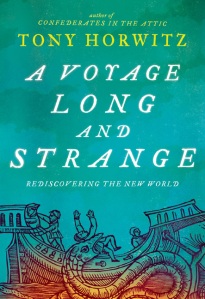A read medium-length and entertaining
 My review of Tony Horwitz's latest historical travelogue, A Voyage Long and Strange, is in this week's edition of Solares Hill, and on the Citizen's website. I liked the book, better than Blue Latitudes but not as much as Confederates in the Attic. Still, a fun and informative read. It will be interesting to see if Horwitz continues along this line or strikes into something entirely new. Maybe we can ask him at the 2009 Key West Literary Seminar, where he will be appearing along with his wife, Pulitzer Prize-winning novelist Geraldine Brooks.
I've since finished another great nonfiction book by an upcoming KWLS panelist (and workshop leader) Patricia O'Toole: The Five of Hearts was really well written history, or biography, or whatever you want to call it. Even if you think you don't give a damn about late 19th century politics and literary history, it's a good read. Last weekend, in one enormous gulp, I read "After You'd Gone," Maggie O'Farrell's first novel. I discovered her earlier this year when I reviewed her most recent, "The Disappearing Act of Esme Lennox," for SH. This first effort hits some of the same themes -- Scottish social oppression, especially of women, historically and now, especially of smart, unconventional women. It's a little melodramatic, especially toward the end. But I bought it. (The story I mean, not the book -- got the book through interlibrary loan, a service I'm starting to use much more now that I work at a library and I don't know why I didn't before.) Speaking of melodrama, I also finished listening to an audiobook, Lady MacBeth, by romance writer Susan Fraser King -- the best part about it was the reader's Scottish accent, which I found replaying in my head all through the day.
My review of Tony Horwitz's latest historical travelogue, A Voyage Long and Strange, is in this week's edition of Solares Hill, and on the Citizen's website. I liked the book, better than Blue Latitudes but not as much as Confederates in the Attic. Still, a fun and informative read. It will be interesting to see if Horwitz continues along this line or strikes into something entirely new. Maybe we can ask him at the 2009 Key West Literary Seminar, where he will be appearing along with his wife, Pulitzer Prize-winning novelist Geraldine Brooks.
I've since finished another great nonfiction book by an upcoming KWLS panelist (and workshop leader) Patricia O'Toole: The Five of Hearts was really well written history, or biography, or whatever you want to call it. Even if you think you don't give a damn about late 19th century politics and literary history, it's a good read. Last weekend, in one enormous gulp, I read "After You'd Gone," Maggie O'Farrell's first novel. I discovered her earlier this year when I reviewed her most recent, "The Disappearing Act of Esme Lennox," for SH. This first effort hits some of the same themes -- Scottish social oppression, especially of women, historically and now, especially of smart, unconventional women. It's a little melodramatic, especially toward the end. But I bought it. (The story I mean, not the book -- got the book through interlibrary loan, a service I'm starting to use much more now that I work at a library and I don't know why I didn't before.) Speaking of melodrama, I also finished listening to an audiobook, Lady MacBeth, by romance writer Susan Fraser King -- the best part about it was the reader's Scottish accent, which I found replaying in my head all through the day.
It was mostly a test to see if my 20-minute commute was enough to make an audiobook worthwhile and I have to say, it was. Fortunately we have a sizeable audiobook collection at the library so I'll be pillaging that for future rides. I'm currently listening to a two-disc NPR compilation of baseball stories, and after that it's a Billy Collins appearance in New York, which includes reading and a talk. Billy, by the way, will be back for next year's seminar. As if you had any doubt.
Next on the plate: More seminar reading: "Dominion" by the recently-added Calvin Baker and Russell Banks' first work of nonfiction, "Dreaming Up America."
The most astounding thing I've read in ages, however, was not between hard covers. It was in the June 2 New Yorker, the issue I just finished because of my obsessive-compulsive habit of reading New Yorkers straight through, in order, which means I'm always at least a couple weeks behind. I had heard of Roger Stone, most recently when my friend Amy broke the news in the Miami Herald of his possible involvement in Eliot Spitzer's downfall. But Jeffrey Toobin's profile of Stone and recounting of his involvement in every American nightmare from Watergate to the 2000 Florida recount was a revelation. Even if you're not a political junkie, this is a story worth reading. And then you can join me in weeping.


